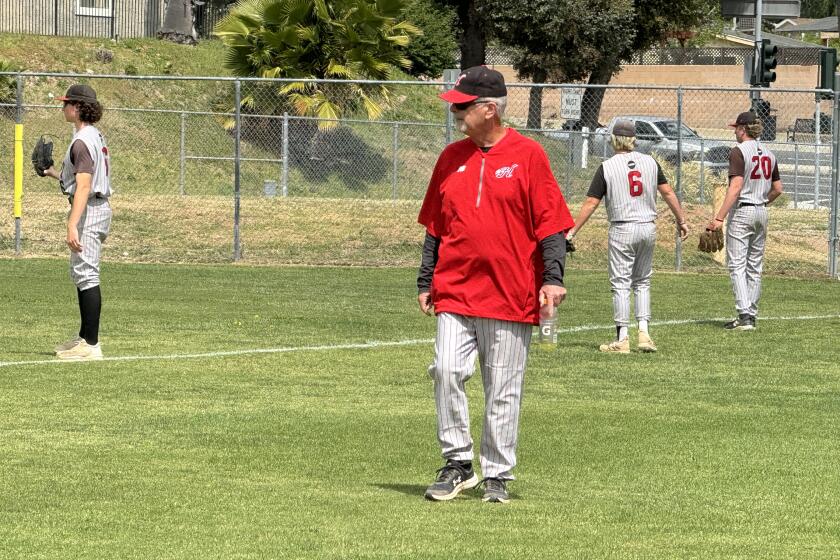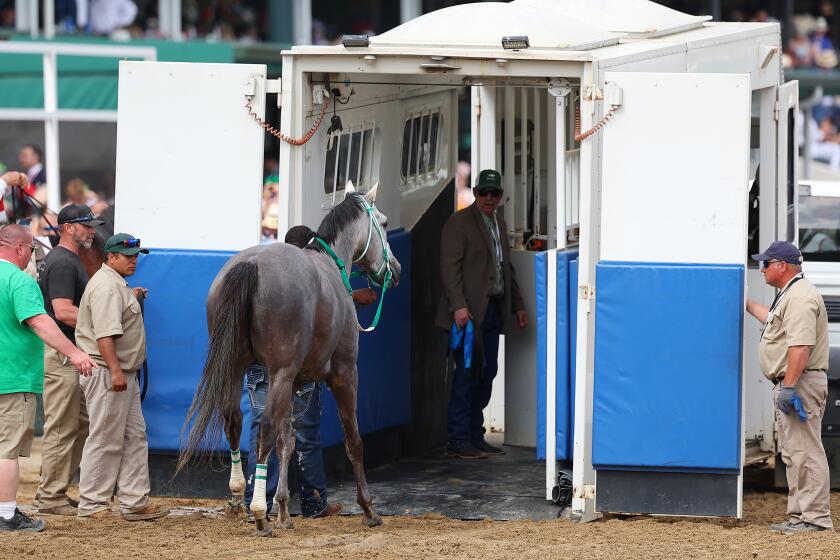It Looks Like the Boys of Summer Are in for a Silent Spring
The man in the street may not understand. Not this time. Not with baseball in this era of incredible prosperity.
The man in the street wonders how they could shut down his spring training at a time when players are making record salaries and owners are raking in record profits. For once, won’t their loss be worse than his?
What could possibly be wrong with a game that has established attendance records six years in a row, has just doubled its national television revenues and never has seen so many teams with realistic chances of challenging for postseason play?
The man in the street knows the ‘80s were good to his game. The average annual player salary went from $143,756 to $490,000. Attendance almost doubled, and virtually every team is aking money. Total industry revenues run around $1.6 billion.
The value of franchises increased again and again and again. The Baltimore Orioles sold for $12 million in 1979 and for $70 million in 1988. Today, their value probably has soared past $100 million.
Baseball is in such terrific shape that last spring then-Commissioner Peter V. Ueberroth asked owners to roll back ticket prices by 75 cents across the board, saying it would send fans a message that ownership was willing to share its prosperity. He left office two weeks later and no action ever was taken.
On the field, eight different clubs won the World Series during the ‘80s, and 22 of the game’s 26 teams got into postseason play. Oddly, the Yankees--a team that was supposed to send the competition into oblivion when free agency began in 1976--failed to win a World Series for the first decade in their history.
In short, the game is robust, and not even the owners, who say the current salary system must be changed, will argue that. In fact, they say whatever problems they face won’t come until 1994 or later, years that aren’t being negotiated in this current labor dispute.
Yet the game is headed for a shutdown. The owners are expected to announce on Friday that they won’t unlock spring training gates until a new collective bargaining agreement is reached.
It’s believed that 18 of the 26 owners strongly favor the lockout and don’t want the game restarted until the players agree to some form of revenue sharing. The players, who say that salaries could decrease and free agency would be restricted by any form of revenue sharing, are in no mood to give up what they have won in court.
Although baseball had work stoppages in 1976, 1981 and 1985, this one is different. For once, it’s the owners who are ready to shut down the game. For once, the players have asked for nothing and likely would accept a roll-over of the current agreement.
This, too, is the most complex disagreement because the owners can’t articulate their problems, especially because almost all agree the current system has worked beautifully. When free agency began, dozens of owners warned the game would be destroyed by spiraling salaries and that all the good players would end up on one team.
That did not happen, and yet, in a sense, that’s what the owners are arguing again. They are asking the players to come to the bargaining table and agree to solve problems that may not exist for several more years, if ever. They are saying that if the current salary escalation continues, the competitive balance of the game is in jeopardy because teams in smaller television markets won’t be able to afford the top players.
Teams now devote about 34% of their revenues to salaries. What the owners have proposed is that they put 48% of selected revenues--about 38% of total revenues--into a salary pot. Players with six years of service would still be eligible for free agency, but players with less than six years would be paid by plugging statistics into a computer, ranking the players and paying them according to rank. Leftover dollars would be spent on free agents.
Using statistics to determine salaries always has been tricky business and no less than the guru of the 20th Century baseball statistic, Bill James, has said that no formula can be devised to determine fair salaries.
But the owners feel they’ve been burned again and again by arbitration, the system by which players in Years 3 through 6 can have their salaries set by an independent arbitrator.
General managers have a laundry list of horrors about arbitrators who don’t know what a batting average is or who decide that if George Steinbrenner paid Player X $800 million, then Player Y ought to get that money too.
A lot of owners agree with Milwaukee Brewers owner Bud Selig, who said, “I don’t mind paying for my own stupidity, but why should I have to pay for someone else’s?”
The owners went into these negotiations wanting two changes in the system. First, they want an end to salary arbitration. Second, they want to implement a form of revenue sharing, a system that appears designed to punish some of the free-spending owners more than the players.
Several owners are furious that a few of their colleagues--George Steinbrenner of the Yankees, Gene Autry of the Angels, Joan Kroc of the Padres and Avron Fogelman of the Royals--have almost single-handedly driven up salaries for everyone.
Ask a dozen people what the eventual solution will be and you’ll get a dozen different answers. At this point, it appears clear spring training camps won’t open. The owners’ Player Relations Committee has also instructed clubs not to let players use their facilities to stay in shape, which means players will be shuffled off to haphazard drills at high school fields.
When the lockout begins, the players’ union probably will file a grievance with the National Labor Relations Board claiming the owners haven’t negotiated in good faith. They’ll say lockout language has been added to contracts for almost a year and that the strategy all along was to shut down spring training.
If the owners are ordered to open the camps, the players will have scored a significant victory.
A more likely scenario involves what labor disputes almost always come down to: a test of wills. How long are the owners prepared to shut down the game? How long are the players prepared to wait? Both sides have huge strike funds--$170 million for the owners, $70 million for the players--and both can afford to wait a long time.
Eventually, they will end up back at the bargaining table, and eventually, there will be an agreement. A lot of general managers and agents believe that agreement will resemble the current one, and that some form of revenue sharing could begin with product licensing money (the two sides are now competitors in the marketing of T-shirts and other souvenirs).
“Public opinion is going to play a big role,” the agent said. “In the past, the players have been the greedy jerks. This time, it’s the owners who are shutting down the game. It’ll be interesting to see how it’s played out.”
More to Read
Get our high school sports newsletter
Prep Rally is devoted to the SoCal high school sports experience, bringing you scores, stories and a behind-the-scenes look at what makes prep sports so popular.
You may occasionally receive promotional content from the Los Angeles Times.






